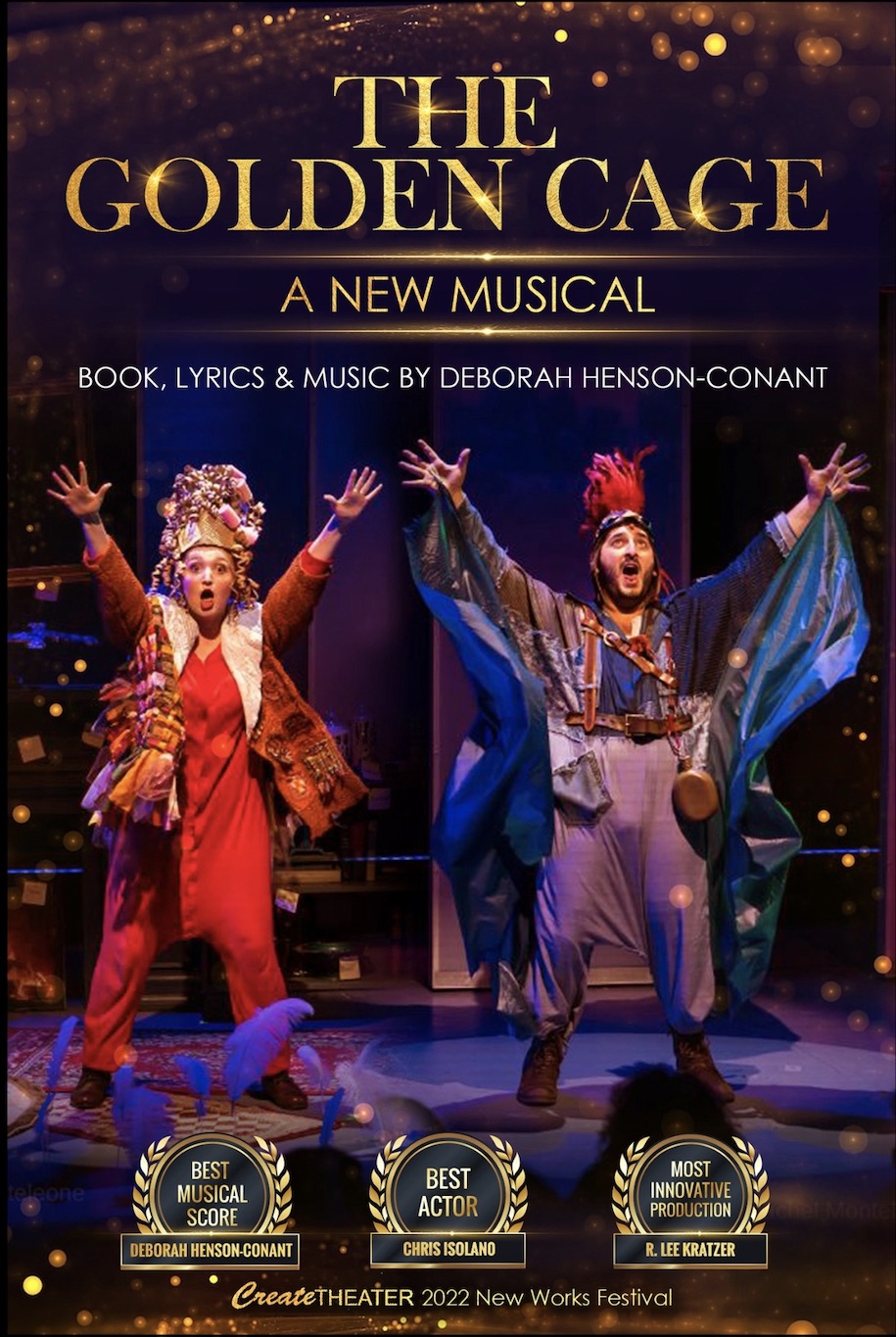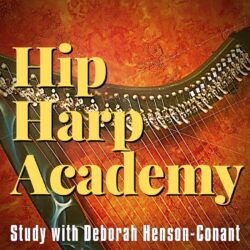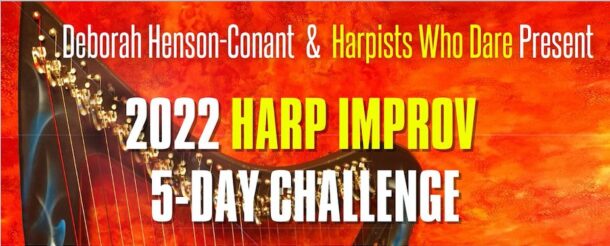At the conclusion of many of the online courses at Hip Harp Academy, the students have the opportunity to complete a “Final Beginnings” video project. We call these Final BEGINNING Projects because I tell the students to focus on imperfect completion as a way to end one phase of learning and begin the next, rather than sliding into an endless pattern of trying to perfect something. These are the videos students submitted at the end my “Jazz for Harps” 12 week program that took place summer 2018.
Alicia DAWES-SALAZAR
Artist's answers to DHC's questions
Describe your final project so I know exactly what you’re sending me.
Orpheus arrangement, looper with improv, 1-2-5 progression with different rhythms, some harp drumming which is very new to me and very fun!
What principles from this course or from chats did you use to develop, perform, and record this project – and how did they play a part in your process?
This is my second attempt at answering the questions as my internet dropped as I clicked submit and only two minutes submit so sorry for all the mistakes along the way.
I learned a lot from inside Jazz tunes and really enjoyed exploring the roadmap and how to understand/ arrange it.
I also got a lot of ideas from summer harp jam which gave me so many fun progression to play around with and explore freely.
The weekly chats have been excellent. I have loved watching DHC answer questions by playing the harp and giving so many inspiring examples.
The chats have also given me a sense of support and belonging which has given me the confidence to share.
Give a short description of what it took for you to be able to play what you did – both logistically and emotionally.
Emotionally it has been very challenging. I am quite private with my playing and never share anything publicly so it has been a little bit scary.
I have always loved messing around with pieces and changing/ rearranging them but have never been able to complete anything so it was definitely quite challenging to put some structure to the arrangement.
What freedoms and blocks within yourself did you connect with (or struggle with) in the process?
All my insecurities came out. I tried to hide myself as much as possible for the half baked as I didn’t really know what I was doing but really wanted to take the leap and get some feedback. All DHC’s ideas where so inspiring and gave me so many ideas to work on which then gave me confidence to share and not hide away. The red dress was kind of like a symbol for this sense of freedom from my insecurities.
What challenges did you meet while connecting with your own freedom of expression in this project?
I found it very challenging to put a structure around my freedom of expression which is why I have always struggled to complete any arrangement or composition.
What were your personal “Ahas”?
I just can’t get over how much of a difference it has made to be part of such a supportive learning environment with such a fantastic and inspirational coach. Thank you DHC for creating such a wonderful space for learning, connection and imperfection!
Cherie GULLERUD
Artist's answers to DHC's questions
Describe your final project so I know exactly what you’re sending me.
Me figuring out/improvising “Somewhere Over the Rainbow.”
What principles from this course or from chats did you use to develop, perform, and record this project – and how did they play a part in your process?
The patterns for the chords – I – vi – iv. The others are still murky – I’m relying on the sound more than the analysis of what chords go where, but this fall I have committed to go through the Hands on Harmony videos as well as the handouts to get more solid on this.
Give a short description of what it took for you to be able to play what you did – both logistically and emotionally.
“Somewhere Over the Rainbow” is my favorite song. I played and sang it at my mother’s funeral as well as at other when I was younger and playing out all the time. I am tired from a big weekend of Grandkids and worries about family events. My broken wrist is healing. Music helps me heal. Emotionally I want to spend more time on this to get it up to snuff, but let’s call it a work-in-progress. I composed another piece for the assignment yesterday and wanted to submit that, but in reading over what the assignment really was I felt I’d get more out of doing a jazz standard than composing a folk song.
What freedoms and blocks within yourself did you connect with (or struggle with) in the process?
In the bridge – all those chords! I must memorize the STRUCTURE. I found that I play better when I put my folk harp up on something high and stand rather than schlumping in a chair to play. I felt like it really started to click towards the end, but then I got self-conscious. Going from a full arrangement to not even a lead sheet – just the chords scratched out on a paper – is a big deal. Now if I can internalize the patterns so I can truly play anything by ear.
What challenges did you meet while connecting with your own freedom of expression in this project?
I wanted to try this on folk harp. Even though I keep my Dusty Strings tuned in Eb to play in any key, my go-to for jazz and pop songs is usually my Camac Big Blue or my Lyon and Healy Chicago Petite (my FAVORITE!) I’ve been so impressed about how DHC uses her folk harp MORE in the workshops than the pedal harp that I decided to see if I can get to that level of facility on mine. It’s much easier than I thought! I also figured out “The Rose” and some other pop/jazz songs and surprised myself that I could do them without the music – or with very limited music glancing. I wish I had not been so apologetic at the end. It’s always hard for me to remember what a gift the playing of the harp is to people and that almost everyone just loves it. I would like to be OK with the whole being more than the sum of the parts when I play.
What were your personal “Ahas”?
One day I felt like Helen Keller must have when the water in her hand at the pump connected with the word Anne Sullivan was spelling in her other hand. I just could hear and see and feel the handful of chords in a song with greater fluidity than I ever have. I’m not there yet, but I am on the road!
Angela IRNICH
Artist's answers to DHC's questions
Describe your final project so I know exactly what you’re sending me.
“Orpheus” (flute/harp)
We did an intro, two verses with theme and flute improvisation (somewhat mixed) and an ending.
What principles from this course or from chats did you use to develop, perform, and record this project – and how did they play a part in your process?
I used what we learned about chords and voicings and different patterns in “Inside Jazz Tunes” and combined the chords of “Orpheus” with the Bossa Nova rhythm of JHW-01C Warmup #5. What I enjoyed very much was the process of trying different chord voicings and finding the “right ones” and getting the rhythm.
Give a short description of what it took for you to be able to play what you did – both logistically and emotionally.
I had to practice the rhythm a lot.
We had to experiment with with the sound levels of flute and harp.
What freedoms and blocks within yourself did you connect with (or struggle with) in the process?
We took your advice from the halfbake and created a sort of rhythm-free intro with improvisational character. Great emotional difficulties there – because I hate to improvise while my partner is in the same room though it were only a few bars. But he improvised all his life and I never dared, so I felt very insecure.
The other thing you told me was doing a spare (sparse?) rhythm in the second verse while my partner improvises. That was not possible for me in one week with any hope of fluency but I experimented with it and hope to use it some other time.
What challenges did you meet while connecting with your own freedom of expression in this project?
If I try to answer all these questions…
What were your personal “Ahas”?
… I’ll never be able to submit this project.
Annelies KOLE
Artist's answers to DHC's questions
Describe your final project so I know exactly what you’re sending me.
I played ‘My Funny Valentine’. I played the melody with comping in the left hand and also played chords in the right hand. I played an Improv of 1 chorus. Because it is rather slow, it will take 3.39.
What principles from this course or from chats did you use to develop, perform, and record this project – and how did they play a part in your process?
I learned from the chapters of comping the left hand stride. That, for me, was the hardest way of comping, but also a nice sound. So I studied on the stride and tried to get it better. And I used it in the comping of My Funny Valentine. I also used all the tips of improvising: 10 minutes, playing with others, making frases. So I got less afraid of playing improvisations.
However I made a lot of video’s of this piece. Every time I listened, tried to improve my improvisation on the point I didn’t like. But than there was always something else I didn’t like. So I thought about being imperfect and final-beginning and I decided to bring in my first video of this piece. So these three things I learned.
Give a short description of what it took for you to be able to play what you did – both logistically and emotionally.
I played the road map with different ways of playing the chords as in comping and voicing. I played it rubato and in rhythm. I played different chords beneath the top note of the melody.
I first started with the melody DHC made, but I wanted to play the original melody. I noticed that there were more chords and it was easier for me to play it in the original key. So I had to do it all over, but it went rather fast. And now I’m not afraid of complicated chords anymore. I understand what is written, I know how to play them and I know what to omit.
What freedoms and blocks within yourself did you connect with (or struggle with) in the process?
I connected with my feeling of being perfect and playing perfectly. I can’t being perfect and I’m okay with that. Most of the time it’s a good feeling, and when not, I work harder, but I will be okay with my imperfection at some point. And that gives a feeling of freedom for me. I enjoy learning from others and I’m not afraid of asking stupid questions or looking silly anymore. I think one of the reasons is that I learned more about all the jazz materials, but also because of me accepting that it can’t be perfect. That’s one of the differences between classical and jazz music, I think: In my education, classical music has to be perfect, but jazz music can’t be perfect because there is always another different way.
What challenges did you meet while connecting with your own freedom of expression in this project?
Making this video and accepting the result and love me for it.
What were your personal “Ahas”?
I love jazz. I love playing it and I like listening to it. But I want to take all this love, learning and experiences in making my own music. Sometimes that will be a jazz standard and improvise on it, sometimes a (modern) classical piece or folk and improvise on it. Perhaps making my own piece of music, who knows. But I’m not a jazz-musician. I am a musician.
Margi MILLER
Artist's answers to DHC's questions
What principles from this course or from chats did you use to develop, perform, and record this project – and how did they play a part in your process?
I learned a jazz roadmap, and once I got the progressions down and the changes, I was able to memorize the tune rather than use sheet music. LIBERATION!
Give a short description of what it took for you to be able to play what you did – both logistically and emotionally.
Juggling between the “intellectual” part of memorizing the roadmap and then playing the song with ease and relaxation took HOURS and probably up to 50 video tries!
What freedoms and blocks within yourself did you connect with (or struggle with) in the process?
The blocks happen when I realize I’m recording myself and “might” make a mistake. The freedoms happen when, while playing, I can say to myself: “you are going to make it!!!”
What challenges did you meet while connecting with your own freedom of expression in this project?
I was challenged over and over to relax my face and hands and HAVE FUN.
What were your personal “Ahas”?
That improvising over the roadmap is MUCH EASIER than trying to play the song!!!
Debra SAWYER
Artist's answers to DHC's questions
What principles from this course or from chats did you use to develop, perform, and record this project – and how did they play a part in your process?
The exploration of different ways to approach this particular progression. Deborah had shown us many ways to do it but when it came to performing it the basic chords stuck until I learned how to UNLOCK them. From chats, from the coaching on Half baked et al. I am still studying the presentation — and at first I thought a lot about it especially since I was singing with accompaniment. I played the other progressions, some are easier, but this one I feel I have to get the inside out of it so I can play with voice, feel comfortable with the roles, and smile cause I know what I am doing even with the surprises that always arise. I love Jazz for Harps and Im not done!!;)
Give a short description of what it took for you to be able to play what you did – both logistically and emotionally.
I think I explained some of it above. As said I really had to think about it and choose my approach for the final beginning. God knows I’ve been playing Pacabell for a wedding coming up and I am metronomed to the walking 4/4. In a way I’m sure it helped. This was rubato because i still haven’t reached comfort level.
What freedoms and blocks within yourself did you connect with (or struggle with) in the process?
Blocks were more fears — fear of too much space, not enough space, too many notes, overcompensating, falling out of rhythm, wrong notes and hitting the strings too hard plus keeping my lazy thumb in the air. The freedom is basically I now know I can do this because I am studying it!!! not flying through it or giving it up. I want it to be MINE!! I want to own it.
What challenges did you meet while connecting with your own freedom of expression in this project?
the battle between the dominant– Holding back on too much expression with the harp and letting the voice lead. I have watched Deborah do it many times. She has demonstrated the way to Mantalay. Really studying the process and applying it is holding back my inclinations of the past.
What were your personal “Ahas”?
AHA to the progression and its variables. AHA to what it feels like to give space to the voice. AHA to say I am not done. I still have a ways to go on this baby!!
Sally WALSTRUM
Artist's answers to DHC's questions
What principles from this course or from chats did you use to develop, perform, and record this project – and how did they play a part in your process?
I put this together very last minute so it doesn’t feel terribly thought out to me. I think I went rogue since I usually incorporate most of my half bake feedback into the final but went off the map this time. I was trying to get used to the road map for Black Orpheus by using the alternate melody.
Give a short description of what it took for you to be able to play what you did – both logistically and emotionally.
I put this together very last minute so it doesn’t feel terribly thought out to me. I think I went rogue since I usually incorporate most of my half bake feedback into the final but went off the map this time. I was trying to get used to the road map for Black Orpheus by using the alternate melody.
What freedoms and blocks within yourself did you connect with (or struggle with) in the process?
Logistically, it was a matter of getting comfortable with the road map. I struggled to get it in my brain. I finally stopped stressing over it and eventually it became ingrained in my brain and body.
What challenges did you meet while connecting with your own freedom of expression in this project?
I feel way too classical. I struggle trying to get a more appropriate sound for a pop/jazz tune. It feels rushed and like I’m not breathing/phrasing. I wanted to do a more upbeat rendition but my technical ability gets in the way as I tend to over complicate. I tried to make the arrangement & improvisation easier. I was somewhat successful since I managed to create something
What were your personal “Ahas”?
It’s okay to keep things simple but I struggle with the concept. It will take time to give myself permission to let go and realize that less sometimes can be more.
Anne HORTON (without video)
Artist's answers to DHC's questions
What principles from this course or from chats did you use to develop, perform, and record this project – and how did they play a part in your process?
My apologies that I have not submitted a final project video, but as requested I am completing these questions anyway.
I am very pleased that I managed to submit a Half-Baked project and I will answer the following questions about that submission.
The most useful principles from the HHA chats and courses which motivated me to submit a Half-baked project were:
*it doesn’t have to be perfect
*keep it simple – within your capacity
*relax and enjoy what you are doing
*JUST DO IT!
Give a short description of what it took for you to be able to play what you did – both logistically and emotionally.
Logistically:
*I have my harp space set up ready to film at any moment. This saves time and removes obstacles *Playing something REALLY basic (a I-IV-I progression that I was familiar with)
*Adding a couple of things I was not familiar with so I could get feedback from DHC
Emotionally:
*I tell myself that most of the other students probably feel as inadequate as I do … and maybe me submitting something that is so far from perfect can inspire them to give it a go too 😉
*I was still coming off the high from being at the Jazz Retreat in Brazil and after surviving (and immensely enjoying) that huge challenge I was feeling quite brave
What freedoms and blocks within yourself did you connect with (or struggle with) in the process?
My most freeing thing was the FREEDOM TO BE IMPERFECT. If I had thought it needed to be perfect then I would not have submitted anything. (which could also be partly why I have not submitted a final project because I felt it needed to be “better” and “closer to perfect” – and that was a block to me.
What challenges did you meet while connecting with your own freedom of expression in this project?
* It is tempting to think that because I had not completed the course then I couldn’t do a final project any justice. THIS IS WRONG THINKING.
* Thinking that a final-project should be better than a Half-Baked and being concerned that I might be able to make a Final-Beginning Project technically better, but not capture the same “freedom and joy of expression” that my half-baked had. THIS BLOCK IS “PAST SUCCESS IS PARALYSING ME” (scared that the next thing I do won’t be as good as the last thing!).
* I realise that I am really driven by getting a response/feedback … that REALLY motivated me to make sure I definitely did a Half-Baked (because DHC gives feedback for the Half-Baked which is invaluable). There is no feedback for the Final Projects.
* DHC talks about making your final-project “relevant” and I know she recommended that I start to put together a repertoire … I need to catch that vision as it seems an impossibly distant goal – I see that our next course will be addressing this … PERFECT!! I can’t wait!!
* Personal challenges due to three of my friends all going through a sudden life crisis during the time between the Half-Baked and the Final project – because I prioritised helping them I just didn’t have time to do a final project justice.
What were your personal “Ahas”?
If I can relax and genuinely enjoy myself, then I will maximise the chances that my audience will feel relaxed and enjoy what I am doing too – even if what I am doing is totally basic and only “something LIKE what I would like to do!” 😉





Join for Freebies, Stories & News
Join to get weekly-ish emails with stories, videos & events like concerts & classes
Yay! You should get my next newsletter within the next 7-10 days. I'm so happy we'll be in touch!
I won't ever share your email address with others - and you can unsubscribe anytime, tho most people say they really enjoy these weeklish emails.